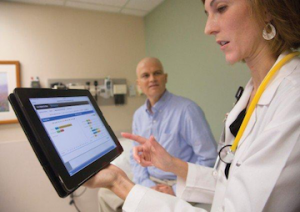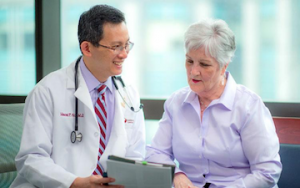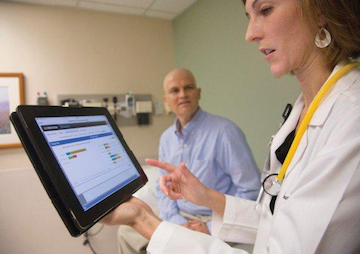Introduction
SPM member, Danny van Leeuwen, Health Hats, introduces a new blog sponsored by the Patient-Centered Clinical Decision Support-Learning Network: Patient Expertise: Sharing and informing choices to connect research and clinical experience.
Patient expertise provides a platform for the Patient-Centered Clinical Decision Support (PCCDS) Learning Network (@pccdsln) to offer current perspectives in the field (via a blog hosted by Danny van Leeuwen, updates on breaking news, and a twitter feed). The website is located here We plan to post at least monthly. The posts will blend relevant science with stakeholder narrative. The PCCDS-LN seeks to promote the conversation between patients, care partners, clinicians, IT experts, and researchers to move toward an ideal state in PCCDS. We realize that deep-rooted obstacles stand in the way of visioning, let alone reaching an ideal state. We also know that success depends on appreciating the business and workflow of clinical practices, the challenges and flow of people’s lives, and the fragmented technology connections. With your help and participation, we can select, prioritize, and take meaningful steps in a positive direction. Let’s take a step – let’s talk. Join us here where you can read, comment, and get involved.
We are partnering with SPM by cross-posting here on SPM’s blog, sharing posts, articles, thoughts about on either or both our platforms, and co-authoring material about Patient-Centered Clinical Decision Support that may be vital to SPM.
Danny van Leeuwen, MPH, RN, patient activist @healthhats danny@health-hats.com
Barry Blumenfeld, MD, Project Director and Principal Investigator, PCCDS-LN bhb@rti.org
First Post
Inching Toward the Ideal
Imagining is necessary but not sufficient. Depending on where you sit, the ideal state can seem miles away or insurmountable. I want to get closer to that ideal state without burning myself out. You’re reading this because you care about Informed Decision-Making, Clinical Decision-Making, or Making Health Choices. You are at least ankle deep if not eyeball deep Clinical Decision Support (CDS). So, let’s talk.

Using PCCDS, patients and providers discuss and prioritize treatment options.
The Patient-Centered Clinical Decision Support (PCCDS) Learning Network seeks to promote the conversation between patients, care partners, clinicians, IT experts, and researchers to move toward an ideal state in CDS. We realize that deep-rooted obstacles stand in the way of visioning, let alone reaching an ideal state. We also know that success depends on appreciating the business and workflow of medical practices, the challenges and flow of people’s lives, and the technology connections. Complicating things further, clinicians and patients and their care partners are diverse characters across the widest possible continuum. Patients’ comfort with their medical surroundings has some but limited relationship to their understanding of medical language and their bodies. Family personalities, dynamics and social circumstances have bewildering variation. Clinicians can range from those who feel, the relationship with my patients is most important to me, to those who feel, just get me through the day, I’m so tired. Likewise, patients and their care partners could range from, I’m driving my own train, to Just tell me.

Diagnosis and treatment partnerships are the primary goal of PCCDS.
With your help and participation, we can select, prioritize, and take meaningful steps in a positive direction. Let’s take a step – let’s talk. Do our imaginings ring true? What’s missing? Imagine we can move the dial. What would you do next?
Clinician
- Imagine that your patients know their life priorities and their life challenges and can and will communicate them to you.
- Imagine that you have a key to the Tower of Babel and can communicate with anyone.
- Imagine that you have the latest research at your fingertips so you can have informed conversations with your patient.
- Imagine that your patients and caregivers understand that recommended treatments might work. It’s an experiment based on pretty good research, your clinical experience and training, and your sensitivity to them.
- Imagine that your patients trust you.
- Imagine that you and your patients have all the time you need together with no distractions for you or them.
- Imagine that your practice runs so efficiently and effectively that most of your face time with patients is spent in relationship building, exam, and problem-solving.
- Imagine that your EHR is a partner, not a hand slapper, chiming in with useful information when you need it (and not when you don’t)
- Imagine that patients can and do submit corrections to the data in their records and that those corrections can be reviewed and entered quickly.
- Imagine that it’s easy to track in the EHR how well the actions taken to treat, worked over time using your entries and their entries.
- Imagine that the recommendations chosen automatically populate a personal care plan for your patient along with all the other choices you made together about treatment and self-care.
- Imagine that they will follow the plan, track progress, and let you know when they don’t and why.
- Imagine that the up-to-date treatment plan and tracker is shareable in real time with anyone the patient chooses using any EHR or health app.
Patient and Care Partner
- Imagine that you have all the information you need to make decisions about your medical treatment including cost of those choices.
- Imagine that the information can be shared with your family, friends, and advisors so you are prepared to advocate for yourself and make decisions with your doctor.
- Imagine that you can talk about your life’s goals and challenges and that your doctor can hear you.
- Imagine that all health professionals realize that they are guests in your life.
- Imagine that you have time to talk and share with your doctor without distractions.
- Imagine that your doctor trusts you to be the expert about you.
- Imagine that your doctor helps you understand research and how it applies to you.
- Imagine that you have a care partner who goes to doctor visits with you, listens and advocates for you.
- Imagine that your health and wellness choices and plans can be found in your EHR.







Recent Comments